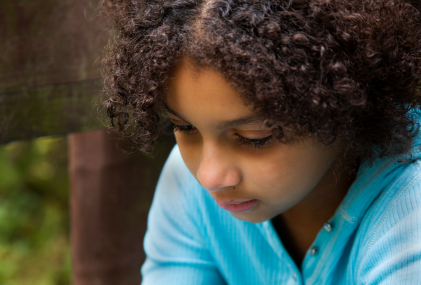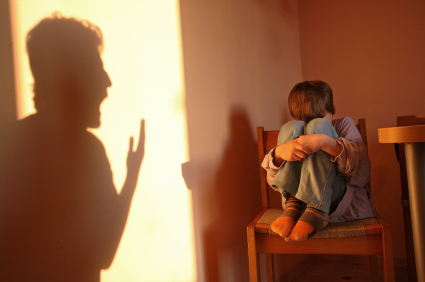Mothers Who Were Abused in Childhood Secrete Less Oxytocin While Breastfeeding
A recent study suggests that women who experienced moderate or severe abuse in childhood secrete less oxytocin while breastfeeding their own children. Oxytocin is a hormone that promotes emotional bonding. The study included 53 women. They breastfed their newborn children while blood samples were collected from the women via IV. Those women with a history of moderate or severe abuse (emotional, physical, or sexual) or neglect (emotional or physical) had lower measures of oxytocin in their blood during breastfeeding than women with no history or abuse in childhood or a history of mild abuse.
A history of abuse or neglect was more common among women with current depression compared to women with a history of depression or anxiety. Women who had never experienced depression or anxiety were least likely to have a history of abuse or neglect.
The study by Alison Steube and colleagues, presented at the 2016 meeting of the Society of Biological Psychiatry, suggests that traumatic events that occur during childhood may have long-lasting effects. These experiences may modulate the secretion of oxytocin in adulthood. Low oxytocin has been linked to depression.
Adversity May Increase Risk of Mood Disorders
In adults with bipolar disorder, adversity in childhood has been associated with an earlier onset of bipolar disorder compared to those who did not experience some form of adversity such as verbal abuse, physical abuse, sexual abuse, loss of a parent, abandonment, or neglect. At the 2013 meeting of the Society of Biological Psychiatry, Nancy Low et al. reported that the number of these stressful life events a child experienced was associated with the number of their anxiety symptoms, psychiatric disorders, and lifetime substance abuse. Having experienced 3 or more adversities was associated with a 3.5-fold increased risk for developing a mood disorder and a 3-fold increase in anxiety disorders and alcohol or drug abuse.
While the study has not yet been published in a peer-reviewed journal, the abstract (#194) may be found in the meeting supplement, Volume 73, Number 9S of the journal Biological Psychiatry.
Editor’s Note: Low’s study is the first to report that childhood adversity is a risk factor for the onset of bipolar disorder in the general population.
Given the increasing evidence for the persistence of epigenetic marks on DNA and histones (which can’t change the sequence of genes but can change their structure) in those who have experienced such stressors in childhood, this could provide a mechanism for the long-term vulnerability of these children to the development of mood disorders and a variety of physical illnesses.
U.S. Patients with Bipolar Disorder Have More Stressors in Childhood and Prior to Illness Onset
In research published since 2008, our Editor-in-Chief Robert M. Post and colleagues in the Bipolar Collaborative Network have compared patients with bipolar disorder in the United States to those in Germany and the Netherlands. Compared to the European sample, patients in the US have more genetic vulnerability to bipolar disorder (by having a parent with bipolar disorder), earlier onsets of their illness, more complicated courses of illness, greater treatment resistance, and more medical comorbidities. Patients in the US also have more psychosocial stress.
The researchers are now turning their attention to these psychosocial vulnerabilities, and in a new paper that will be published in Psychiatry Research (late in 2013 or early in 2014), the authors show that patients in the US had more stressors both in childhood and just prior to the onset of their illness. Childhood stressors analyzed in the study were verbal abuse, physical abuse, and sexual abuse. Stressors in adulthood included indicators of a lack of social support, troubles with finances or employment, lack of access to health care, and medical comorbidities.
The stressors patients experienced just prior to their most recent episode of bipolar illness were related to: stressors in childhood, an earlier age of illness onset, anxiety and substance abuse comorbidity, lower income, both parents having an affective illness such as depression, and feeling more stigma.
The new research suggests that for patients with bipolar disorder in the US, adverse life events in childhood and later in life are more prevalent than they are for patients in the Netherlands or Germany. Earlier and more effective approaches to these stressors, such as the Family-Focused Therapy developed by David Miklowitz and Kiki Chang, could potentially slow the onset or progression of bipolar illness in this country.
Neuronendocrine Function in Sexually Abused Adolescent Girls
Brooks R. Keeshin from a research group led by Frank Putnam presented a poster at the 2012 meeting of the American Academy of Child and Adolescent Psychiatry (AACAP) on neuroendocrine function in recently sexually abused adolescent girls with and without post-traumatic stress disorder (PTSD). Average age of the girls was 15 and they had experienced the sexual abuse six months to one year before the study. The researchers found that morning cortisol awakening response was flattened in the girls, and this was associated with PTSD severity and the severity of intrusive symptoms. Increased adversity prior to the sexual abuse experience was also associated with flattening of the cortisol awakening response.
The researchers suggest that alterations in the hypothalamic pituitary adrenal axis (HPA) appear around the time of the abuse and are associated with the severity of PTSD symptomatology in sexually abused adolescent girls.





